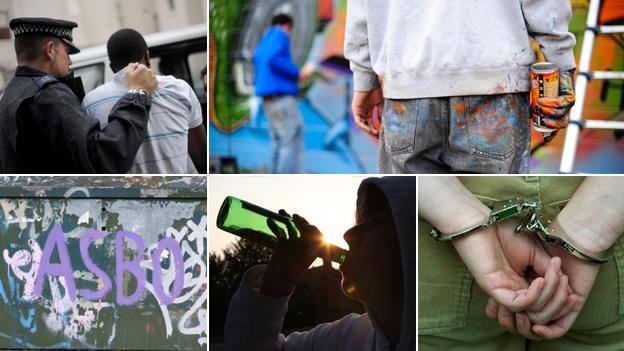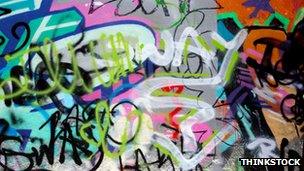Asbo: The end of an era
- Published

Ministers are scrapping the anti-social behaviour order, but its acronym - immortalised via countless nicknames and T-shirt slogans - will take longer to shift from British common parlance. So why did Asbos capture the imagination?
In 2005 a new word entered both the Oxford and Collins English dictionaries. Four letters and two syllables long, it was concise and instantly memorable - Asbo.
It stood for anti-social behaviour order, a legal mechanism first introduced across England, Scotland and Wales in 1998.
But very quickly it came to mean something altogether more.
Perhaps it was the acronym's brevity and rhythm. Or it might have been to do with burgeoning unease about social breakdown.
Either way, Asbo quickly became shorthand for anything to do with disruptive, antagonistic behaviour contrary to societal norms.
Headline writers seized upon the term with gusto. A mini-industry flourished selling T-shirts, hoodies and even babies' playsuits emblazoned with Asbo-related slogans.
Bands were formed with names like Asbo and The Asbo Kid, the freshly minted word offering a suggestion of rebelliousness and up-to-the-minute savvy.
The trend extended to the animal kingdom. An American pit bull cross shot dead by police marksmen after it mauled a baby in south London was the subject of <link> <caption>widespread press attention</caption> <url href="http://www.google.co.uk/url?sa=t&rct=j&q=&esrc=s&frm=1&source=web&cd=7&ved=0CF4QFjAG&url=http%3A%2F%2Fwww.thisislondon.co.uk%2Fnews%2Fpitbull-called-asbo-savaged-boy-months-before-it-went-on-rampage-6880347.html&ei=pau8T_K8DMO3hQesqvD9Dg&usg=AFQjCNEdsSAaEgSOXtOi6Pui3tiK3ayv1A&sig2=oLtQXauDIgSl-Yk-OL_QHA" platform="highweb"/> </link> after it emerged the dog's owner had named it Asbo.
Two years later an aggressive swan which attacked a series of rowers on the River Cam in Cambridgeshire was, inevitably, christened <link> <caption>Mr Asbo</caption> <url href="http://www.telegraph.co.uk/earth/wildlife/9240768/Violent-swan-Mr-Asbo-finally-removed-from-Cambridge-river-after-attacks-on-rowers.html" platform="highweb"/> </link> by the media.
But then concerns began to be expressed that those "Asbo" T-shirts were not only being sported by individuals with a keenly developed sense of irony. In 2006, a report by the Youth Justice Board suggested the order had become a "badge of honour" to some.
Critics argued over whether it was a symbol of the Blair government's creeping authoritarianism or a godsend for communities blighted by a minority of nuisance neighbours.
Either way, Asbos had made the leap from legal jargon into popular culture.
Now the government has announced plans to scrap them and six related orders, replacing them with the less-euphonious CBOs (Criminal Behaviour Orders) and CPIs (Crime Prevention Injuctions).
But it may take longer to shift the word itself from conversational English.
"As acronyms go, it's an easy one to pronounce," says Charlotte Brewer, professor of English language and literature at Hertford College, Oxford. "If you're reading an article it jumps out of the page at you.
"It's not that it was describing a new phenomenon - people have always behaved badly to their neighbours. But sometimes a word just takes off."
Certainly, there were plenty of Asbos that captured the imagination. A Wearside woman banned from <link> <caption>having noisy sex</caption> <url href="http://www.independent.co.uk/news/uk/crime/noisy-sex-asbo-breach-woman-caroline-cartwright-avoids-jail-1875870.html" platform="highweb"/> </link> with her husband, an 87-year-old ordered to stop <link> <caption>playing her Glenn Miller records too loudly</caption> <url href="http://www.thesun.co.uk/sol/homepage/news/4248415/OAP-slapped-with-ASBO-for-loud-music.html" platform="highweb"/> </link> and a man banned from <link> <caption>sniffing petrol</caption> <url href="http://www.guardian.co.uk/uk/2005/mar/12/drugsandalcohol.jeremylennard" platform="highweb"/> </link> on forecourts in Teesside all secured reams of column inches for the orders.
But some argue that the acronym caught on because it reflected a common sense of malaise. The year 2005 saw another word added to the Collins English Dictionary - chav, defined as "a young working class person who dresses in casual sports clothing".
According to Peter Squires, professor of criminology and public policy at the University of Brighton, both terms were popularised at a time when the poorest in Britain were increasingly set apart from the rest of society and demonised.
"It was a media phenomenon - Vicky Pollard, Jeremy Kyle, this intense scrutiny of the underclass," he says. "And then you had Asbo T-shirts. It became an alternative cultural icon."

Pretty? Or just annoying?
Nonetheless, Squires believes that, although overall crime rates were falling in this period, genuine frustrations about anti-social behaviour and the failure of the authorities to tackle it were widespread.
"What was preoccupying people was a range of low-level nuisances that the police didn't prioritise," Squires adds.
"It's the idea of the short, sharp shock - a metaphorical clip around the ears. The Asbo had that element of quick and dirty justice. That was part of its populist appeal."
This certainly won the system many supporters in areas affected by anti-social behaviour. For nearly two years Lesley Pullman, 63, had to endure near-constant noise and harassment before she helped secure Asbos against a gang who congregated around a house in her street in New Moston, Manchester.
Residents who complained were subjected to intimidation and Pullman's car was repeatedly vandalised. But as a result of the orders - secured directly as a result of campaigns by local people - two troublemakers were jailed, and the torment ceased.
"It was like a magic wand round here," she says. "It was the first time in my life that legislation was brought out specifically for communities. It was empowering."
For sceptics, however, Asbos were an illiberal mechanism to target behaviour that would not ordinarily warrant criminal prosecution.
Civil libertarians protested that the orders undermined Labour's promise to be "tough on the causes of crime" and tacitly encouraged vigilantism.
"They made us a more judgemental, censorious country," Squires says. "But I'm not sure they were very effective at all."
As evidence he cites Youth Justice Board research suggesting that after being imposed, half of all Asbos were broken.
For Pullman, however, this was not evidence of failure but proof that firm action needed to be taken against the perpetrators - a mechanism that she says would not have existed without Asbos.
"We expected (the orders) to be breached," she says. "These were repeat offenders, after all.

Garden flytippers will be fined under the new order
"But the badge of honour stuff was rubbish. It's just bravado - the perpetrators hate them. You see it in their faces when they go into court. That's why they get their solicitors to fight them so hard."
The public's own attitude towards them was curiously counter-intuitive. A Mori poll in 2005 suggested that 82% supported Asbos, despite the fact that only 39% believed they were effective.
Now, of course, their days are numbered. Ministers say Asbos are overly bureaucratic to impose and that crime should be treated as crime.
In their place, the government says its new orders will be available at an earlier stage of bad behaviour and be easier and faster to use. They are also piloting a "community trigger", whereby police would be forced to respond if five households complain, or the same individual complains three times.
Even before the Conservative-Liberal coalition came to power, the government had fallen out of love with the Asbo. The year 2006 saw the number issued drop by 34%. In 2008, Home Secretary Jacqui Smith called for greater use of "early intervention" measures, echoing remarks by Children's Secretary Ed Balls that he wanted to live in a society that "puts Asbos behind us".
Despite this, the term itself shows little sign of departing the national discourse.
"This interesting thing is, when it disappears judicially, whether the word will stay," says Brewer.
If it does, popular culture's attachment to this handy acronym might tell us yet more about modern Britain.
Key changes explained
<bold>Existing powers on the left, proposed powers on the right</bold>
Key: CRASBO = Criminal Anti-Social Behaviour Order; DBO = Drink Banning Order; CR DBO = Drink Banning Order on Conviction; ASBI = Anti-Social Behaviour Injunction; ISO = Individual Support Order; IO = Intervention Order.
- Published29 July 2010